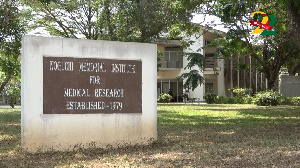Health News of Friday, 30 April 2021
Source: www.ghanaweb.live
FLASHBACK: Noguchi needs initial amount of $3m for coronavirus vaccine – Director
On April 30, 2020, the Director of the Noguchi Memorial Institute for Medical Research Prof. Abraham Kwabena Annan stated that about 3 million dollars was needed to prepare a vaccine to help fight the COVID-19 pandemic.
He disclosed that the institute has sent a budget to the government to enable it conduct a ground-breaking research.
Read the full
Read full article
Noguchi Memorial Institute for Medical Research (NMIMR) will require an initial amount of $3million to begin the preparation of a vaccine for the novel coronavirus (COVID-19), and conduct other research works, that’s according to its Director, Prof. Abraham Kwabena Annan.
He disclosed to Akwasi Nsiah on Ghana Kasa on Kasapa 102.5FM that the Institute has already sent its budget to the government to enable it to conduct ground-breaking researches.
“We’ve informed the government that we need adequate resources including funding to enable us to come out with such novel medical research findings. The President has announced that a fund has been set up to help fight COVID-19. As I speak the government is about to release funds to enable us to begin the process to look for a vaccine for COVID0-19 and conduct other tests. We expect an initial amount of $3million.”
Researchers at the Noguchi Memorial Institute for Medical Research (NMIMR – College of Health Sciences) and the West African Centre for Cell Biology of Infectious Pathogens (WACCBIP – College of Basic and Applied Sciences) at the University recently successfully sequenced genomes of SARS-CoV-2, the virus responsible for the global COVID-19 pandemic, obtaining important information about the genetic composition of viral strains in 15 of the confirmed cases in Ghana.
The scientists, analyzed samples from selected cases to gain a comprehensive understanding of the variations of the virus that are present in the country.
Genome sequencing allows for the compilation of the most comprehensive information about an organism’s genetic makeup. Using advanced next-generation sequencing methods, scientists are able to track and compare viral mutations to understand the origins of imported strains and to discover if any novel strains are emerging locally.
“The successful establishment of this sequencing capability at University of Ghana is a significant milestone in Ghana’s response to the pandemic, as it will strengthen surveillance for tracking mutations of the virus and aid in the tracing of the sources of community infections in people with no known contact with confirmed cases,” said Prof. Abraham Anang, Director of NMIMR.
Samples analyzed were taken from two travellers who arrived in Ghana from the UK, one from Norway, one from Hungary, one from India, and one traveller who arrived from the United States through the United Arab Emirates. Nine samples were taken from individuals who had no travel history, who are believed to have acquired the infection locally.
“The data tells us that, while there were some differences between the strains from the various countries, all the 15 genomes generally resembled (with >92% similarity) the reference strain that was isolated in the Wuhan Province of China, where the outbreak began,” said Prof. Gordon Awandare, Director of WACCBIP.
“This confirms that we are dealing with the same pathogen and that it has not yet changed its genetic make-up significantly. It is natural that pathogens will evolve as they encounter different environmental challenges, so we will need to continue monitoring to keep track with these changes and determine how they impact on the efficacy of potential drugs or vaccines that are being developed”, he added.
The information from the sequence data has been shared with scientists around the world through an open-access platform known as the Global Initiative on Sharing All Influenza Data (GISAID) database, where other sequences from various countries are stored (https://www.gisaid.org/).
Entertainment










